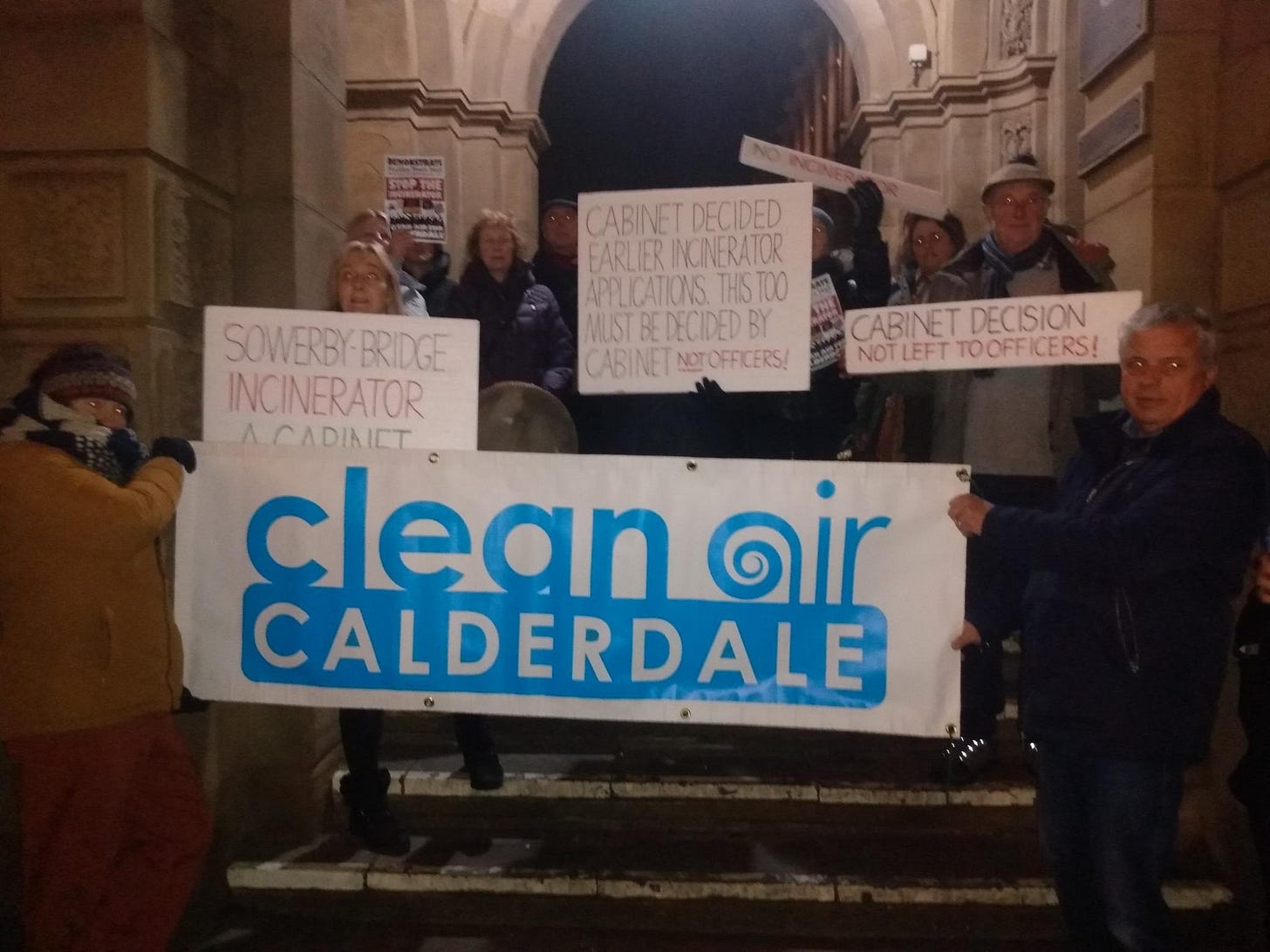Calderdale MP backs assisted-dying principle but abstains on bill vote
Plus, anger at the council after incinerator operator granted licence
Hello and welcome to the fourth edition of The Calderdale Lead.
I hope everyone has had an enjoyable week, especially with the weather picking up - however briefly the respite from the cold and rain proves to be.
It’s been a busy week for Calderdale MPs Josh Fenton-Glynn and Kate Dearden who both have taken different stances on the much-debated assisted dying bill that went before Parliament yesterday.
We’ve more on how they voted - or didn’t - below.
Plus, the pair have called for a meeting with a Government minister after Calderdale Council granted a licence for a controversial incinerator in Sowerby Bridge - a saga that has been running for over a decade.
Calderdale MP explains decision to abstain on assisted-dying bill
Calder Valley MP Josh Fenton-Glynn has said he backs the principle of the assisted-dying bill despite abstaining on yesterday’s Parliamentary vote.
After a debate lasting more than four hours, MPs voted to back the Terminally Ill Adults (End of Life) Bill by a margin of 330 to 275.
The proposed legislation, tabled by Labour backbencher Kim Leadbetter, says that anyone who wants to end their life must:
be over 18 and live in England and Wales, and have been registered with a GP for at least 12 months
have the mental capacity to make the choice and be deemed to have expressed a clear, settled and informed wish, free from coercion or pressure
be expected to die within six months
make two separate declarations, witnessed and signed, about their wish to die
satisfy two independent doctors that they are eligible - with at least seven days between each assessment
Currently, legislation in the UK prevents people from asking for medical help to die.
Mr Fenton-Glynn abstained from the vote and set out his reasons for doing so in a Facebook post after yesterday’s debate.
He said he could not support the bill in its current form but did reveal that he agreed with the principle that the bill was trying to establish.
“As it stands I don't think the safeguards are strong enough. Currently an assessment that someone is at the end of their life and eligible for an assisted death will be made by two doctors and a judge,” Mr Fenton-Glynn wrote.
“However while those two doctors and the judge must give regard to the possibility of coercion, by dint of their jobs the judgement will be primarily medical.
“I would like to see more views brought in on this - for example social workers who are more experienced in identifying coercive control in family situations.”
Mr Fenton-Glynn had revealed earlier in the week that he was still undecided and went into yesterday’s debate
He said: “My indecision is not because I have not thought through the issues, indeed I've perhaps considered it more than any other issue than I've addressed since joining the House of Commons.
“I have spoken to experts, listened to constituents and read a number of books and reports on the subject since the bill was brought forward.”
Under the proposals, a High Court judge would have to rule each time a person makes a request to end their life. A patient would then have to wait 14 days before acting.
A doctor would prepare the substance being used to end the patient's life, but the person would take it themselves. The bill does not make it clear which drug would be used.
It would be illegal to coerce someone into declaring they want to end their life, with a possible 14-year prison sentence.
MPs from all parties made passionate speeches on both sides of the argument Labour’s Mr Fenton-Glynn said: “We heard from medical professionals on both sides of the debate and those drawn by religious conviction.
“We heard some remarkable speeches from those with direct experience working with and representing vulnerable communities, including Jess Asato whose opposition was drawn from her experience working on violence against women and girls and her fear of family coercion at the end of life, and Florence Eshalomi who talked about racial differences in how people are treated by the medical community.
Mr Fenton-Glynn said he would look to hold consultation events in the new year and will make a final decision on whether to back the bill when it comes back from the committee stage.
Halifax MP Kate Dearden did back the bill.
She hasn’t yet commented on her decision to do so.
The bill will now go forward to a public bill committee where MPs will spend several weeks going through it line-by-line before it returns to the House of Commons with potential amendments for MPs to vote on again.
MPs seek ministerial meeting over Council’s decision to grant incinerator licence
Additional reporting by LDRS’ John Greenwood
Calderdale MPs Josh Fenton-Glynn and Kate Dearden have requested a meeting with Environment Secretary Stephen Reed after Calderdale Council granted a licence for a controversial incinerator in the borough.
Calder Valley Skip Hire has planning permission to operate the small waste incineration plant (SWIP) but could only do so with the permit, initially in the council’s remit.
A previous permit application was effectively refused by a Government Planning Inspector following a public inquiry into the council’s deemed non-determination of the issue, John Woolcock believing it was potentially harmful to human health.
The company has argued it does not believe the incinerator is harmful to human health.
Despite that decision, current rules nationally mean fresh permit applications can be made.
This week, council officers using delegated powers – itself an issue contested by campaigners who say Cabinet councillors should have made the decision – have approved the latest application.
Publishing the decision on its website, the council says that when determining the environmental permit, consideration had to be given to a number of factors, most importantly the protection of the environment and human health, in line with Government and European legislation.
Other specific issues were considered, including the large number of representations made on a wide range of issues during the three consultation periods, it says.
Both Calderdale MPs have said they’re disappointed with the decision.
Issuing a joint statement, Mr Fenton-Glynn and Ms Dearden said: “These decisions are rightly informed by evidence, but the views of local communities matter equally.
“Our constituents overwhelmingly oppose the incinerator, and this was reflected in our submissions to the consultation.
“This is certainly not the outcome either of us wanted.
“Whilst the Council has announced measures they say will ensure the local community will not be negatively impacted, should this decision go ahead we will be closely monitoring and requesting regular meetings to ensure all protections outlined are put in place.”
The council says the decision includes a number of conditions “to ensure that the plant will not have any detrimental effect on local residents, their amenity, or the wider environment.”
The council will implement a monitoring and compliance plan, which focuses on four key elements – physical site inspection, scrutiny of the required monitoring data, continuing air quality monitoring in the area and involving the local community to ensure concerns and issues are addressed.
The plan will be used to ensure that any future operations at the site are robustly regulated and that any issues can be dealt with quickly and so can maintain the confidence of the local community, says the council.
Calderdale Council’s Assistant Director for Neighbourhoods, Andrew Pitts, said: “I have granted permission for an Environmental Permit in accordance with the Environmental Permitting Regulations of 2016, using the powers delegated to me under the council’s constitution.”
Leader of the Council, Coun Jane Scullion said: “We understand the strong local feeling around this permit application, and I know that this decision will be disappointing for the community.
“It has been made very clear that there must be absolute compliance with the conditions of the permit, and this will be robustly monitored by the council through a planned programme of inspections as well as continued air quality monitoring in the local area.”
A complicated history stretching back nearly 10 years has seen Calderdale Council refuse planning permission for the incinerator, that decision being overturned on appeal to the planning inspectorate, and objectors winning the right to a judicial review of a subsequent decision by the council’s cabinet to grant an environmental permit, after which the permit was quashed.
Following this, the status of the permit application was deemed to be “undetermined”, hence the company’s appeal, which Planning Inspector John Woolcock dismissed after in inquiry, effectively refusing it, and now the new application.
That’s all for this week, don’t forget to share The Calderdale Lead with friends and family who you think might be interested in receive it. You can do so by clicking the button below. And if you’re in a position to do so, please consider taking a paid subscription so I can keep popping into your inbox twice-a-week with this Calderdale digest and stories.
And, as always, if you have anything you think I should be reporting on or looking into then I’m on calderdale@thelead.uk
Thanks for reading - enjoy the weekend!
Andrew





